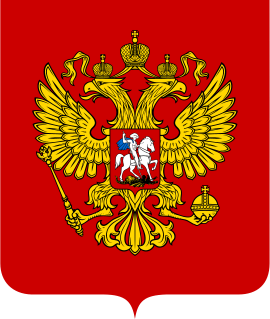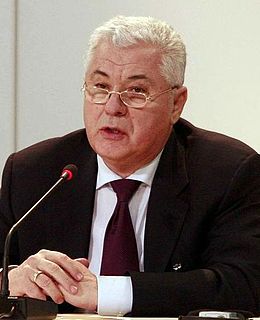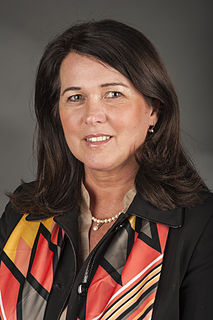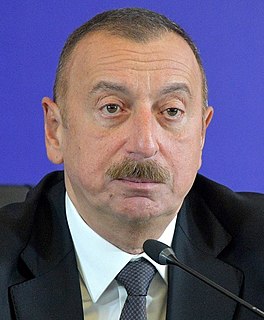
The Politics of Kyrgyzstan, officially known as the Kyrgyz Republic takes place in the framework of a parliamentary representative democratic republic, whereby the President is head of state and the Prime Minister of Kyrgyzstan is head of government. Executive power is exercised by the government. Legislative power is vested in both the government and parliament. The Economist Intelligence Unit has rated Kyrgyzstan as "hybrid regime" in 2016.

The Politics of Azerbaijan takes place in a framework of a semi-presidential republic, with the President of Azerbaijan as the head of state, and the Prime Minister of Azerbaijan as head of government. Executive power is exercised by the president and the government. Legislative power is vested in both the government and parliament. The Judiciary is nominally independent of the executive and the legislature. The state system of Azerbaijan defines the Constitution of the Republic of Azerbaijan. According to the constitution, Azerbaijan is a democratic, secular, unitary republic.

The New Azerbaijan Party is the ruling political party in Azerbaijan. It was formed on 18 December 1992 by the former President of Azerbaijan Heydar Aliyev, who led it until his death in 2003. It is now led by his son, Ilham Aliyev, who succeeded his father as the party leader and as President of Azerbaijan since 2003.

On the federal level, Russia elects a president as head of state and a legislature, one of the two chambers of the Federal Assembly. The president is elected for, at most, two consecutive six-year terms by the people. The Federal Assembly has two chambers. The State Duma has 450 members, elected for five-year terms, using a system of proportional representation, where parties gain a percentage of seats equal to the percentage of national votes they gained, with a 7% threshold required to gain any seats in the Duma. The Federation Council is not directly elected; each of the 85 federal subjects of Russia sends 2 delegates to the Federal Council, for a total of 170 members.

Belarus elects on national level a head of state - the president - and a legislature. The president is elected for a five-year term by the people. The National Assembly has two chambers. The House of Representatives has 110 members elected in single-seat constituencies elected for a four-year term. The Council of the Republic has 64 members, 56 members indirectly elected and eight members appointed by the president.

The National Assembly, also transliterated as Milli Majlis, is the legislative branch of government in Azerbaijan. The unicameral National Assembly has 125 deputies: previously 100 members were elected for five-year terms in single-seat constituencies and 25 were members elected by proportional representation; as of the latest election, however, all 125 deputies are returned from single-member constituencies. Milli Majlis was the first secular republican parliament in the Muslim world.

After adaptation of Constitution of the Republic of Azerbaijan (1995), new legislative acts and amendments were issued in line with democratic principles and in consistency with requirements of international law within the legal reforms in Azerbaijan. Generally, there are 48 Articles regarding principal human and Civil Rights and Freedoms in the Constitution of Azerbaijan. In particular, section 3 of the Constitution establishes the major rights and freedoms of citizens of Azerbaijan, including human rights, property rights, equality rights, intellectual property rights, civil rights, the rights of the accused, the right to strike, social security, the right to vote and freedom of speech, conscience and thought.

Parliamentary elections were held in Armenia on 12 May 2007. 1,364 candidates ran for the 131 seats, 41 of which were constituency seats with the remaining 90 being filled by a proportional party-list system. The electoral threshold is five per cent.

The 2005 Nagorno-Karabakh parliamentary elections were held in the internationally unrecognised Nagorno-Karabakh Republic on 19 June 2005. The election saw the two pro-government parties, the Democratic Party of Artsakh and Free Motherland, win a large majority of seats. The opposition criticised the conduct of the election but international election monitors generally praised the election.

A presidential election was held in Azerbaijan on 15 October 2008. Ilham Aliyev of the New Azerbaijan Party was re-elected with 87% of the votes, according to official results. Several major political parties, including Musavat, the Azerbaijan Popular Front Party, Azerbaijan Liberal Party, and the Azerbaijan Democratic Party boycotted the vote because of alleged poll-fixing and oppression of political opponents.

Parliamentary elections were held in Moldova on 5 April 2009. The Party of Communists of the Republic of Moldova (PCRM) won a majority of seats for the third consecutive occasion. Turnout was 59%, exceeding the 50% necessary for the election to be valid.
A constitutional referendum was held in Azerbaijan on 18 March 2009. It consisted of 29 measures voted on separately; the most controversial were a measure to abolish presidential term limits and a measure to greatly restrict press freedom. The measures passed, with approval of measures between 87.14% and 91.76%, disapproval between 4.59% and 7.24% and invalid votes between 3.64% and 5.70%; turnout was 71.08%.

A parliamentary election was held in the unrecognized Nagorno-Karabakh Republic on 23 May 2010.

Early presidential elections were held in Kazakhstan on 3 April 2011, having been originally scheduled for 2012.

Parliamentary elections were held in Kazakhstan on 15 January 2012. The result was a victory for the Nur Otan party, which won 83 of the 98 seats in the Mazhilis. However, the Organization for Security and Co-operation in Europe (OSCE) stated that the election "did not meet fundamental principles of democratic elections."

Parliamentary elections were held in Belarus on 23 September 2012. At stake were the 110 seats in the House of Representatives, the lower house of the National Assembly of Belarus.

Presidential elections were held in Azerbaijan on 9 October 2013. The result was a victory for incumbent President Ilham Aliyev, who received 84.5% of the vote, whilst leading opposition candidate Jamil Hasanli finished second with 5.5% of the vote.

The European Parliament election, 2014 for the election of the delegation from Hungary to the European Parliament was held on 25 May 2014.

Presidential elections were held in Azerbaijan on Wednesday, 11 April 2018. Eight candidates ran for the presidency. Incumbent President Ilham Aliyev was re-elected president for a seven-year term. The election was the first since the 2016 Constitutional Referendum, which extended the presidential term from five to seven years.
Parliamentary elections were held in Azerbaijan on 1 November 2015. The result was a victory for the ruling New Azerbaijan Party, which won 69 of the 125 seats in the National Assembly amidst an opposition boycott.


















